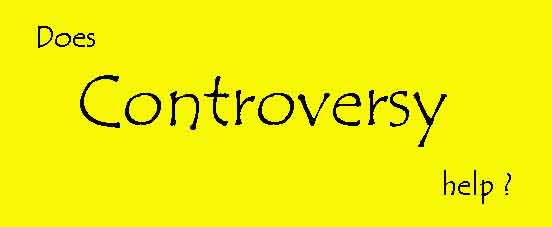Marketing, advertising, publicity etc are all means by which organizations let the people know about their products or services by calling for their attention by attracting them. Companies invest huge amounts of money in making advertisement campaigns, studying market behavior and showcasing product value through print media, TV, OOH (Out Of Home), magazines etc. These days’ business organizations outsource their advertisement campaign projects to professional agencies who with their creative inputs are responsible of conveying the message and value of products to the prospective customers. They use theirmarketing innovations, creativity, innovative ideas, taglines, celebrities etc to ensure quality publicity. However on the contrary, at times it happens that certain organizations take a different undefined route in marketing, and that is by simply creating a buzz through controversies.


Does Controversy Help Marketing ?
The basic aim of advertising and publicity is to reach out to as many people as possible and letting them know about the things they would get once they get associated with a certain brand by spreading a word of mouth. However, sometimes it happens that even negative publicity benefits organizations and business entities.
A major example of marketing by stirring up controversies is in the entertainment industry. These days almost all movies and television shows create a buzz even before their promos hit the screens. Controversies like fights between celebrities, defamation of a popular figure or culture, stolen ideas etc spread like wild fire and no matter how bad or irrelevant an event is, it creates a buzz amongst the people, thereby acting as a way of free marketing. Gossip columns in newspapers, magazines etc happily publish these controversies which indirectly benefit the movies and shows by prelaunch publicity.
Controversies also exist in industries other than the entertainment industry, where it acts a tool of marketing. Competing products like soaps and detergents often directly show their competitor products in bad light and showcase their brand as a much superior product. These kinds of ad campaigns, where the competitors are shown as inferior, don’t go down well with them and it creates a buzz, as they look to take legal action for the defamation. Thus, these controversies create buzz amongst the customers, thereby giving the brands more visibility. In fact cola giants Pepsi and Coca Cola often create a huge buzz when some of their ad campaigns take a direct shot at each other.
Controversies can create an environment for more visibility and recall of a brand. But in most of the cases, it backfires. The movies, events, products, services etc which stir up controversies for their marketing are only remembered for their controversies and not for their actual value. In the long run, most controversial brands and ad campaigns die out. In some cases, it also benefits the competitor brands as people out of sympathy change their loyalties.
Organizations are always looking for creative and innovative ideas to promote their brands. Celebrities, mascots, events, taglines and logos all form the various elements of creating a brand buzz. But an instant way to reach out to everyone, even though it is negative publicity in most cases, is by cooking up controversies.
No comments:
Post a Comment